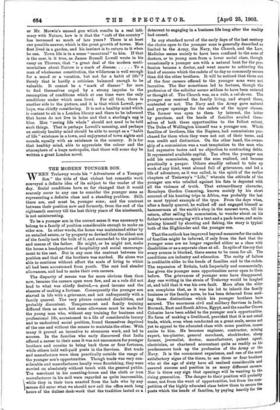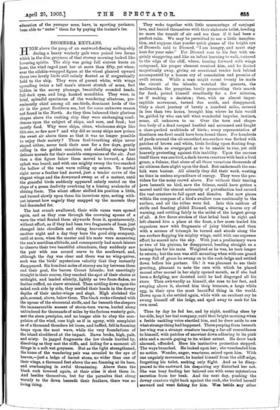THE MODERN YOUNGER SON.
WHEN Trelawny wrote his " Adventures of a Younger Son " the title of that violent but romantic work conveyed a definite idea of its subject to the reader of the day. Social conditions have so far changed that it would scarcely occur to any one to consider the younger sons as representing a definite class and a standing problem. Still, there are, and must be, younger sons; and the contrast between their position now and formerly, from the end of the eighteenth century till the last thirty years of the nineteenth, is not uninteresting.
To be a younger son in the correct sense it was necessary to belong to a family of position considerable enough to make an elder son. In other words, the home was maintained either by an entailed estate, or by property so devised that the eldest son of the family took the bulk of it, and succeeded to the position and means of the father. He might, or he might not, make the house a headquarters of hospitality and social encourage- ment to the rest. But in any case the contrast between his position and that of the brothers was marked. He alone was able to continue without effort the scale of living to which all had been accustomed from youth. The rest had slender allowances, and had to make their own careers.
The disparity of means was far more obvious then than now, because the careers open were few, and as a rule did not lead to what was chiefly desired,—a good income and the chances of making a fortune. Consequently the younger son started in life with a grievance, and not unfrequently with a family quarrel. The very phrase connoted disabilities, and probably discontent. Temperament and family training differed then as now, but some allowance must be made for the young men who, without any training for business and professional life, accustomed to a life of considerable luxury and to undoubted social position, found themselves deprived of the one and without the means to maintain the other. With many it proved an incentive to strenuous work, and led to success. In the families who early discovered that India offered a career to their sons it was not uncommon for younger brothers and cousins to bring back three or four fortunes, while others held well-paid posts in the Services. But trade and manufacture were then practically outside the range of the younger son's opportunities. Though trade was very con- siderable and manufactures locally were flourishing, they were carried on absolutely without touch with the general public. The merchant in his counting-house and the cloth or iron manufacturer in his mill were regarded as quite inaccessible, while they in their turn exacted from the lads who by any means did enter what we should now call the office such long hours of the dullest desk-work that the tradition lasted as a deterrent to engaging in a business life long after the reality had ceased.
In any standard novel of the early days of the last century the choice open to the younger sons is generally described as limited to the Army, the Navy, the Church, and the Law. Medicine seems mainly to have been confined to the sons of doctors, or to young men from a lower social class, though occasionally a younger son with a natural bent for the pro- fession became a doctor, and went nearer to achieving the
kind of success which the cadets of to-day so commonly secure than did the other brothers. It will be noticed that three out of the four careers offered to the younger sons were not lucrative. The Bar sometimes led to fortune, though the profession of the solicitor seems seldom to have been entered or thought of. The Church was, as a rule, a cul-de-sac. The younger son received the family living, and stayed there, contented or not. The Navy and the Army gave natural and proper openings for the cadets of the upper classes. The former was open to them by interest, the latter by purchase, and the heads of families availed them- selves of both these opportunities to the fullest extent. The Duke of Wellington himself was a younger son. Whole families of brothers, like the Napiers, had commissions pur- chased for them when they were not out of their teens, and won credit and distinction. On the other hand, the owner- ship of a commission was a vast temptation to the man who had expensive tastes and no objection to contracting debts. It represented available capital. Too often the younger son sold his commission, spent the sum realised, and became practically a pauper. Others steadily refused to take up work of any kind, went abroad full of grievances, and led a life of adventure, as it was called, in the spirit of the earlier chapters of Trelawny's " Life," wherein the attitude of the younger son who rebelled against his fate is depicted with all the violence of truth. That extraordinary character, Roualeyn Gordon Cumming, known mainly by his short account of his hunting trips in Africa, was probably the last or most typical example of the type. From the days when, after a family quarrel, he walked off and engaged himself as hammerman at the smith's shop in the nearest town, till his return, after selling his commission, to wander about on his father's estate camping with a tent and a pack-horse, and main- taining himself by shooting and fishing, the story is typical both of the Highlander and the younger son.
That the outlook has improved beyond measure for the cadets of families might be inferred, if only from the fact that the younger sons are no longer regarded either as a class with disabilities or as a separate class at all. In spite of the cry that every avenue is blocked, there seems to be room for all. The conditions are industry and education. The rarity of failure is creditable alike to the heads of families and to the cadets. The expansion of Britain, both Imperially and commercially, has given the younger sons opportunities never open to them before. The grievances of younger sons have disappeared. Any one writing in the strain of Trelawny would be laughed at, and told that it was his own fault. More often the elder son complains that, as it was his lot to inherit the family business or the family acres, be has been debarred from seek- ing those distinctions which his younger brothers have secured. The enormous civil and military Services in India, Burmah, East and South Africa, Egypt, and the smaller Crown Colonies have been added to the younger son's opportunities. No form of making a livelihood, provided that it is not retail trade, which, even when conducted on a great scale, seems not yet to appeal to the educated class with some position. comes amiss to him. He becomes engineer, contractor, mining expert, tea-planter, general merchant, stockbroker, sheep farmer, journalist, doctor, manufacturer, patent agent, electrician, or chartered accountant quite as readily as his predecessors took up the profession of the Army or the Navy. It is the commonest experience, and one of the most satisfactory signs of the times, to see three or four brothers who at the age of sixty have all realised considerable and assured success and position in as many different careers. Nor is there any sign that openings will be wanting to the rising generation. The danger to their position will probably come, not from the want of opportunities, but from the com- petition of the highly educated class below them to secure the posts which the heads of families, by paying heavily for the
education of the younger sons, have, in sporting parlance, been able to enter " them for by paying the trainer's fee.



























































 Previous page
Previous page